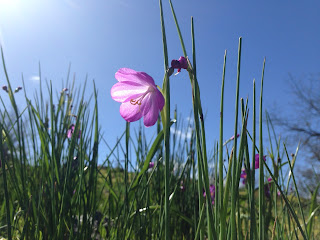Gotcha!! I'm not actually referring to the the flowers "orchids;" orchids native to the Pacific Northwest might not be out for another few weeks or so, despite many other native and non-native flowers that have already been out and blooming.
 |
| More neighbourhood quince! <3 |
An ORCID refers to the unique persistent digital identifier for a researcher, which will stick with you and offer respite from the dopplegaenger researchers who share your name, field, and subfield, especially as your institution changes, name changes (for marriage or other reasons), and disciplinary changes (do your MSc and PhD in ecology, and publish a few articles there, but then undertake an MA in Librarian Studies, and publish there, too). The point is that your ORCID will stick with you no matter how your professional work and life change.
Kristin Briney wrote about this in a blog post on her site Data Abinitio here, commenting on some of the recent news that important publications are requiring that researchers and authors have an ORCID in order to publish with them. Some of the publication include The American Geophysical Union, PLOS, Science journals, Frontiers, and the Royal Society. The list of recent signatories to ORCID's Open Letter can be found here.
 |
| Satin flowers, or Sisyrinchium douglasii!! I found a patch of them while out walking! |
ORCIDs are also the kind of thing that I think would be good to talk about during a weekly lab meeting at the beginning of the year, or something like that. Maybe in a presentation for new graduate students at the start of their program so they can start to think about this as part of being an academic and publishing. It strikes me as a similar idea to obtaining a DOI (digital object identifier), which is a persistent digital link for content that exists digitally (or in print), so you can always find it. I've heard of some recommendations for doing this even for data or supplemental information that researchers make accessible online.
I can certainly support systems and classifications and markers that help make easy identification, organization, and ways to credit specific authors for their intellectual work, which ORCIDs and DOIs seem to support. So cheers to that!
Let me know if you have any thoughts to the contrary! I'd love to hear!
PS. Post on Research Ethics Still forthcoming. It's a longer post, so I'm taking more time to do a good job with it!
No comments:
Post a Comment